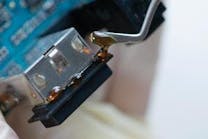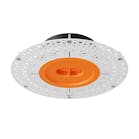Electrolube silicone resins and pastes provide thermal management for reliable LED performance
Effective thermal management of electronic devices and LEDs
Most electronic components are low power and produce negligible amounts of heat in their operation, however some devices, such as LEDs, power transistors, CPUs and power diodes produce a significant amount of heat. Failure to effectively dissipate this heat away from the component or device can lead to reliability concerns, reduced operational lifetimes and can even cause the device to fail.
Electrolube produce a range of thermal management solutions to increase reliability and prolong the working life of devices. The optically clear silicone resin, SC3001, has been specifically designed to meet heat transfer challenges facing the LED industry. The low viscosity, two-part encapsulation compound helps to dissipate heat generated from LEDs and provides a complete barrier for components against harsh and challenging environments, including moisture, chemicals and general contamination.
Silicone or non-silicone thermally conductive pastes can be applied to displace air from a component or heat sink interface. Silicone based pastes, such as Electrolube’s HTS and HTSP, have higher operating temperatures than their non-silicone alternatives, HTC and HTCP. Heat transfer compounds fill the gap between the device and the heat sink, and reduce the thermal resistance at the boundary between the two. This leads to faster heat loss to the heat sink and a lower operating temperature for the device. Heat transfer compounds can be of various types. The "P" versions of Electrolube’s pastes have a higher filler loading and contain a special blend of different fillers to maximise thermal conductivity.
The power of the device needs to be known and assumptions need to be made about the temperature reached by the heat sink. It is possible to calculate the thermal resistance across the boundary and the equilibrium operating temperature of the device, by knowing the thermal conductivity of the heat transfer compound, the thickness of the film of heat sink compound and the contact area of the heat sink.
The ever-increasing miniaturisation in electronics means that heat dissipation problems are becoming significantly more important. Effective thermal management will often lead to enhanced reliability and increased life expectancy of devices. Electrolube’s technical support can help designers find the right thermal management solution for heat transfer challenges and assist with selecting formulated chemicals from their extensive portfolio for all stages of production.
Contact:
Electrolube - Jade Bridges, European Technical Support Specialist
+44(0)-1530-419690





